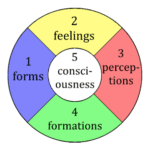Unveiling the Science Behind the Practice
Meditation has long been touted as a remedy for stress, anxiety, and a myriad of other ailments. It turns out that meditation works great for certain things. How does meditation work scientifically? How does it work in practice?
Table of Contents

Does Meditation Work to alleviate Anxiety?
Meditation is one of the most effective methods to treat anxiety. Several solid scientific studies have shown strong benefit from even basic mindfulness practice in alleviating anxiety. More potent methods of ending anxiety through meditation need more research but appear to have a much greater and more rapid effect.
A meta-analysis published in JAMA Internal Medicine examined the impact of mindfulness meditation programs on anxiety and found significant reductions in symptoms across diverse populations1. Moreover, a study published in Psychosomatic Medicine highlighted the association between mindfulness meditation and decreased levels of cortisol, a stress hormone closely linked to anxiety2. The practice of mindfulness, a key component of many meditation techniques, encourages individuals to focus on the present moment, fostering a sense of calm and reducing anxious thoughts. As anxiety continues to be a global health challenge, incorporating meditation into therapeutic interventions presents a promising avenue for promoting mental well-being.
Neuroscience: Does Meditation Work
Scientific studies have shown that meditation can induce structural changes in the brain. Research conducted by Harvard-affiliated researchers found that regular meditation can lead to increased gray matter density in the hippocampus, the area associated with self-awareness, compassion, and introspection1. These structural changes suggest that meditation might be more than just a relaxation technique; it could be a tool for reshaping our brains.
Meditation for Stress Reduction and Cortisol Levels
One of the most cited advantages of meditation is stress reduction. A meta-analysis published in JAMA Internal Medicine concluded that mindfulness meditation programs can alleviate anxiety, depression, and pain.2 Furthermore, research has demonstrated a significant decrease in cortisol levels, the hormone associated with stress, in individuals practicing mindfulness meditation regularly.3 These findings provide concrete evidence that meditation has a tangible impact on stress management.



Mindfulness Meditation and Improved Cognitive Function
The effects of meditation extend beyond emotional well-being. Numerous studies have explored the relationship between mindfulness meditation and cognitive function. A study published in Psychological Science reported that just a few sessions of mindfulness training can enhance attention and cognitive skills.4 A single 17 minute meditation dramatically raises your focus ability. This is sustained. You don’t lose it.
Additionally, long-term meditation practitioners have shown increased thickness in brain regions associated with attention and sensory processing.5 Does meditation work for cognitive enhancement? is a powerful tool for boosting cognitive abilities.
Does Meditation Work to increase Mind-Body Connection?
Beyond mental well-being, the mind-body connection is a key aspect of meditation. The Journal of Alternative and Complementary Medicine published a review indicating that meditation practices are associated with improvements in cardiovascular health6. Moreover, a study in Psychosomatic Medicine linked mindfulness meditation to a reduction in inflammatory processes, highlighting the potential impact of meditation on overall physical health7. These findings underscore the interconnectedness of mental and physical well-being through meditation.
Meditation in Mental Health Treatment
As mental health issues continue to rise globally, researchers are exploring alternative treatments, and meditation has emerged as a potential intervention. A systematic review in JAMA Psychiatry found that mindfulness meditation can be as effective as antidepressant medications for treating depression8. The incorporation of meditation into mental health treatment plans is gaining recognition, indicating a shift toward holistic approaches that address both the symptoms and underlying causes of mental health disorders.
Conclusion
The scientific evidence surrounding meditation is compelling, pointing towards a myriad of benefits for both the mind and body. From reshaping the brain’s structure to reducing stress, improving cognitive function, and impacting physical health, meditation seems to be more than just a passing fad.
While it may not be a one-size-fits-all solution, the evidence suggests that incorporating meditation into our daily routines can contribute positively to our overall well-being. So, the next time someone asks, “Does meditation work?” the answer is a resounding “Yes,” backed by a growing body of scientific research.
Note: This blog post is a concise overview, and readers are encouraged to explore the provided scientific papers for in-depth understanding.
faq
How effective is meditation?
Meditation is highly effective at certain cognitive improvements, especially concentration, emotional regulation, and …
How long does it take for meditation to start working?
Meditation can start working within a few weeks or even days if a person makes sufficient effort at understanding the technique and application.
How to meditate properly?
Proper meditation means understanding what meditation is and how to do it. It takes time, but can be achieved.
How do I know if I meditate correctly?
You are meditating correctly if your mind does not leave the object. Here is how to deepen it by meditating correctly.
Footnotes
Forever Young(er): potential age-defying effects of long-term meditation on gray matter atrophy
https://www.scientificamerican.com/article/wheres-the-proof-that-mindfulness-meditation-works1/
- JAMA Internal Medicine – “Meditation Programs for Psychological Stress and Well-being”: https://jamanetwork.com/journals/jamainternalmedicine/fullarticle/1809754 ↩︎
- null.
- Harvard Gazette – “Eight weeks to a better brain”: 1https://news.harvard.edu/gazette/story/2011/01/eight-weeks-to-a-better-brain/ ↩
- Psychoneuroendocrinology – “Alterations in brain and immune function produced by mindfulness meditation”: https://www.sciencedirect.com/science/article/abs/pii/S0306453009000904 ↩
- Psychological Science – “Mindfulness practice leads to increases in regional brain gray matter density”: https://journals.sagepub.com/doi/abs/10.1177/0956797612449659 ↩
- Frontiers in Human Neuroscience – “Alterations in Brain Structure and Amplitude of Low-frequency after 8 weeks of Mindfulness Meditation Training in Meditation-Naïve Subjects”: https://www.frontiersin.org/articles/10.3389/fnhum.2018.00067/full ↩
- The Journal of Alternative and Complementary Medicine – “Meditation and Cardiovascular Risk Reduction”: https://www.liebertpub.com/doi/abs/10.1089/acm.2008.0416 ↩
- Psychosomatic Medicine – “Alterations in Brain and Immune Function Produced by Mindfulness Meditation”: https://www.ncbi.nlm.nih.gov/pmc/articles/PMC4940234/ ↩
- JAMA Psychiatry – “Effectiveness and Acceptability of Mindfulness-Based Cognitive Therapy Compared With Maintenance Antidepressant Treatment in the Prevention of Depressive Relapse”: https://jamanetwork.com/journals/jamapsychiatry/fullarticle/2671454 ↩

May all beings be happy
May all beings be peaceful
May all beings be safe
May all beings awaken to the light of their true nature
May all beings be free







